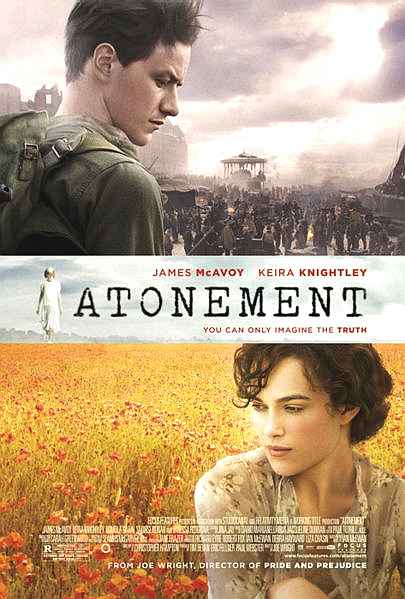Saoirse Ronan stars in Joe Wright's HANNA, opening April 8.
See It On Any Screen
 Saoirse Ronan only appears in the first 50 minutes or so of Joe Wright's film of the Ian McEwan novel ATONEMENT, playing the young Briony Tallis (after that, her character ages into Romola Garai, and then Vanessa Redgrave). This section, which takes place over the course of a single day in 1935, is the most effective part of the film. The 13-year old Briony drives the action that will determine the entire story, and Ronan, who had previously appeared in some British TV, captures the mix of pique, profound confusion, half-conscious jealousy, and an intemperate need to form and tell cohesive stories that leads her to unwittingly destroy the lives of those closest to her. It would have been easy to make Briony a bad seed, spitefully out to hurt people, but--as her adult self comes to realize--the tragedy of her decision is that she talked herself into believing she was telling the truth when accusing the housekeeper's son Robbie (James McAvoy)--also her sister's (Keira Knightley) lover--of a rape he didn't commit. Ronan was nominated for Best Supporting Actress for the performance, which led to her fine work in the misconceived The Lonely Bones and a very strong smaller role in the little-seen The Way Back.
Saoirse Ronan only appears in the first 50 minutes or so of Joe Wright's film of the Ian McEwan novel ATONEMENT, playing the young Briony Tallis (after that, her character ages into Romola Garai, and then Vanessa Redgrave). This section, which takes place over the course of a single day in 1935, is the most effective part of the film. The 13-year old Briony drives the action that will determine the entire story, and Ronan, who had previously appeared in some British TV, captures the mix of pique, profound confusion, half-conscious jealousy, and an intemperate need to form and tell cohesive stories that leads her to unwittingly destroy the lives of those closest to her. It would have been easy to make Briony a bad seed, spitefully out to hurt people, but--as her adult self comes to realize--the tragedy of her decision is that she talked herself into believing she was telling the truth when accusing the housekeeper's son Robbie (James McAvoy)--also her sister's (Keira Knightley) lover--of a rape he didn't commit. Ronan was nominated for Best Supporting Actress for the performance, which led to her fine work in the misconceived The Lonely Bones and a very strong smaller role in the little-seen The Way Back. In the new Hannah, both Wright and Ronan are tackling the action genre for the first time, but the opening part of Atonement makes that seem like less of a reach than you might think. Wright, who had previously directed Pride and Prejudice, injects the Atonement opening with great energy--Briony is repeatedly seen running through her manor house at such speed that she could be Jack Bauer racing to disarm a terrorist bomb. Christopher Hampton's script, jumping back and forth in time through that day, creates a thriller atmosphere as we move closer to what we sense will be the terrible consequences of what began as a lovely day, and Dario Marianelli's brilliant score uses the sound of Briony's typewriter as a tense motif.
The more cinematically colorful second chapter of Atonement, centering on Robbie's attempt to get out of wartime France and ultimately on the Dunkirk evaculation, suggests that Wright still has some limitations as a director. Partly it's because this is the section of McEwan's book most cut down for the film; all that's left is the sentimentality (which Wright's subsequent The Soloist proved to be his undoing). And Wright starts showing off, most notably with a 6 minute single shot that pans and tracks throughout Dunkirk and its beachfront without much cause beyond its own virtuosity. The film recovers somewhat when back in London for the final sections, but doesn't quite manage its attempt to find a cinematic equivalent for the novel's revelation that what we've been reading is itself a work of metafiction, "Briony's" attempt to atone for her long-ago sin.
Atonement was quite successful for an art-house movie, with a worldwide gross of $130M, which followed $121M for Wright's Pride and Prejudice. However, the more expensive Soloist could only muster $38M worldwide, which may explain why Wright is tackling an action movie. As classics-minded filmmakers go, Wright brings unusual punch to his projects--neither of his period films has that Merchant/Ivory museum feel--and while Ronan has been in some uneven films, she has yet to give a bad performance. Hanna has potential to widen the playing field for both of them.






0 comments:
Post a Comment